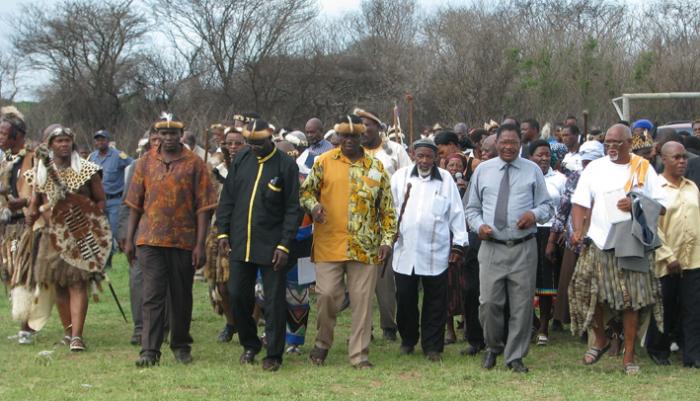Posted on November 21, 2010

The Ndwandwe march. Photo credit: Mbongiseni Buthelezi
Zwide Heritage Celebration: 185 years on
13 November 2010, Mbazwana, Northern KwaZulu-Natal
The day is just turning a breezy warm at 10:20 when the procession marches from the inkantolo (court) to the marquee erected on the soccer field on the other side of the fence. In the lead are Ndwandwe notables from KwaZulu-Natal, Mpumalanga, Limpopo and the Gaza province of Mozambique. They include Nyangayezizwe Justice Nxumalo, host of the event, Eugene Nyumayo from Mozambique, S.D.W. Nxumalo from Limpopo and a Nxumalo inkosi from Wasbank near Ladysmith. It's a sombre crowd that walks along. They are singing a stirring ihubo: "Nang' uMzila sebeyamsola"Â ("Here is Mzila being blamed"). When the crowd enters the marquee an imbongi (praise poet) gets up on the stage and declaims Zwide's izibongo (praises).
When Dumisani Nxumalo greets the crowd, he refers to the people as "nina bakaZwide"Â (you people of Zwide, i.e. Zwide's descendents). He then reads a version of Zwide's izibongo (praises) that has been reproduced in several books from James Stuart's collection at the Killie Campbell library in Durban. He goes on at length naming every Ndwandwe and Nxumalo ancestor whose descents might be in the crowd, calling out before each name "nina baka..."Â (you descendents of...). When the introductions and welcomes have been concluded, the event moves on to its most serious aspect: talking about the Ndwandwe past. Two premises that are repeated over and over again for speaking the past by the historians, the masters of ceremonies and almost every other speaker: the Ndwandwe do not know nearly enough about themselves and young people are not being taught about their imvelaphi (where they come from). The young are not being taught because even their parents do not know their history, according to Professor Otty Nxumalo.
The crowd hears the history of the people of Zwide from the South African perspective - "umlando"Â from the perspective of KwaZulu, and from Limpopo and Mpumalanga: the defeat of the Ndwandwe by the Zulu, Zwide's migration north, how the Nxumalo came to be leaders of the Tshangana (Shangaan) people. It also hears from the Mozambique perspective about the establishment of the Gaza kingdom, its later confrontations with the Portuguese, Nghunghunyana's imprisonment and exile in Lisbon and Samora Machel's efforts, which succeed in the end, to get Nghunghunyana's remains repatriated to Mozambique. We hear these stories in a combination of isiZulu, Shangaan and English. The speeches are interspersed with exhilarating performances by scathamiya groups from Bushbuckridge and Nongoma, and two local groups, a very lively indlamu group and gospel singers.
The MEC for Local Government and Traditional Affairs, Nomusa Dube, has been invited as well. She gives a lengthy speech about events such as this needing to be harnessed for community development. When the national chairperson of the Ubumbano lwamaZwide, Mawala Nxumalo, takes the podium to thank the minister for her attendance, he prefaces his speech by asking the group from Intshanga near Durban to sing its ihubo. The igoso sings, "uZwide ufela izwe lakhe"Â (Zwide is dying for his land) and the crowd responds "amabutho ayeza, ayeza amabutho"Â (the troops are coming). In his speech Nxumalo informs the minister that the Ubumbano lwamaZwide, of which he is chairperson, will be approaching government to fund future events of this kind. S.D.W. Nxumalo, Prime Minister to King Mpisane Eric Nxumalo of Limpopo, stresses education in his address on behalf of the king.
The event is concludes with a meal for all those present accompanied by more performances.
Mbongiseni Buthelezi is the Archival Platform's Anestral Stories Coordinator